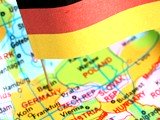Sixteen German Cities
The State Capitals Of Germany
Join us on a journey through sixteen German Cities. The cities we visit are the German state capitals. German states are administrative divisions of Germany with own government represented by ministers and a comparable position to that of a chancellor. The states’ head governs independently in all issues but those affecting the nation as a whole.
Parts of the German government are represented by the state governments and issues like finances, defence, and foreign affairs are collectively overseen.
Each one of the current sixteen states is historical deep-rooted in political units that lead to the new organisation. Regional distinct and rich traditions reflect this fact. Present state boundaries were formed after World War II in 1949 and within the unification of East Germany and West Germany in 1990. Berlin is the capital of Germany and one of the three city state capitals. Since hundreds of years the German cities Berlin, Hamburg and Bremen established themselves as powerful self-governing trade centres that withhold equally the position of city and state.

![]()
Brandenburg Gate at AllPosters
The total of state area forms the Federal Republic of Germany. With the multitude on traditional backgrounds Germany is far away from the general upheld idea of being a sausage with Knodel and Sauerkraut eating and beer drinking nation. On the contrary a wide range of traditional and international cuisine is a lot more likely to experience.
Over time we will introduce the state capitals, the state they represent, and the most interesting things to know about area and culture. So please come back to find out more.
Would you like to share your knowledge about german cities? Contribute to www.german-cities.com!
View Germany in a larger map
- German Cities Blog
- The -- German Cities Blog -- keeps you up-to-date on all things happening on the German-Cities.com web site.
- Learning German in Germany
- Why learning German is an asset? And what difference does it make to study German in Germany?
- Berlin Germany, The capital City of Germany
- Berlin Germany is one of the exciting multifaceted metropolises in Europe. The capital city of Germany surprises in many aspects.
- Munich Germany - Munich Attractions
- Munich Germany, the state capital of Bavaria has the title magic city. For Germany tourists Munich attractions make it a popular destination.
- Stuttgart Germany - Wine and Automobiles
- Location, history, and culture make a travel to Stuttgart Germany part of the magic city destinations.
- Contribute to German Cities
- Would you like to share your knowledge about german cities? Great, find out how you can submit your story or tip here.
 Facts about Germany
Facts about Germany
 Travel Tips
Travel Tips
 Destination Germany
Destination Germany
 Get Around
Get Around
 Find a Hotel
Find a Hotel


New! Comments
Have your say about what you just read! Leave me a comment in the box below.